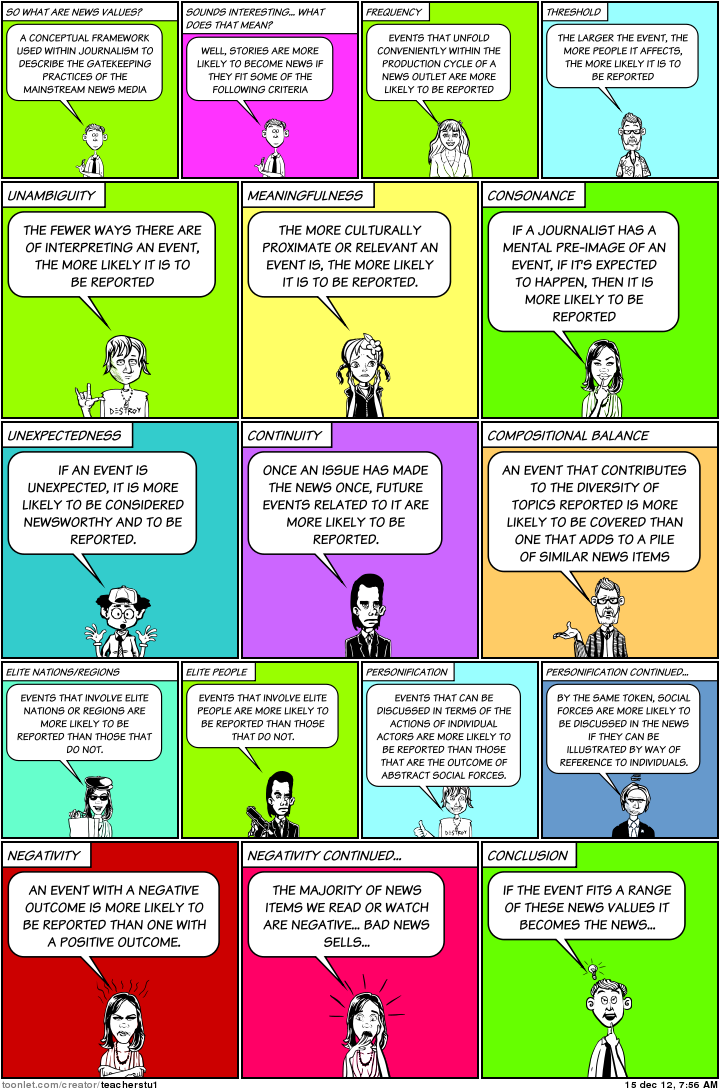Laying the Rage Bait: Journalism on Social Media

Social media is a battlefield of information. More than ever, we are seeing news providers being beaten up by the current structure of information sharing online. There is a fight for relevance. Headlines, images, & NIBs are all crafted to pull in engagement.
I want to explore how I think this is harming the integrity of journalism.
Newsworthiness
Newsworthiness is often defined by Galtung and Ruge's values. There's a really helpful graphic which explains the 12 News Values on the Galtung-Institut website, I've added it below.

It's important to note that not all journalists agree with these values and, arguably, they extend far beyond these 12. Likewise, a journalist doesn't assign a story a News Value before publishing, the values are a study of the stuff that has been published.
Whilst many stories in the news deserve to be reported, it is critical that we understand how subtle presentations of these stories for audiences on social media can shape beliefs and influence emotions.
News on social media
Engagement means everything on social media. It is popularity, it is revenue, it is a way to share things between hundreds of thousands of likeminded people quickly.
News companies have historically struggled to keep up with social media.
"The growing importance of social media for news consumers prompted many news publishers to invest money and resources to get into Facebook’s News Feed. But then social media changed. Platforms de-prioritised news and younger audiences flocked to messaging apps and new platforms such as Instagram or TikTok, where click-through rates are smaller and news content is much more difficult to monetise." - Khan, Reuters
We must remember that Big Tech is owned by individuals who have motives and, like any traditionally successful business, these motives are shaped around profit.
As Big Tech turns its back on news content, deeming it a potential threat to the profit margins, we shouldn't be surprised. Big Tech doesn't owe them anything and if they're not bringing new users to their platform and making them stay, why should they care about news? If you want news, go to the other platform, here you can watch a minor celebrity offer someone a mystery gift!
But the profit model is one of the reasons why so many people are 'migrating' from Big Tech social, causing audiences to 'fracture' as everyone jumps into, what they deem, the best lifeboat.
Many news publishers, especially smaller local outlets, can't afford to run campaigns on every platform for very little reward - especially considering the cost of the current most popular format: video.
To get an idea of how fractured, this is a key finding from the Reuters Digital News Report 2024:
"Six networks now reach at least 10% of our respondents, compared with just two a decade ago. YouTube is used for news by almost a third (31%) of our global sample each week, WhatsApp by around a fifth (21%), while TikTok (13%) has overtaken Twitter (10%), now rebranded X, for the first time."
News organisations are trying to cling on to the audience by splitting their time and efforts. But it's not really working, although they're chasing the audience and trying to raise funds in new ways, social media (even with less revenue) is still crucial.
News still exists on platforms that have deprioritised it - don't be mistaken. You can't escape news, especially on a social platform where people are encouraged to talk about things that matter to them.
What we are witnessing is a change in how stories are reported in order to keep up with social media and to encourage clicks - the action which brings news publishers the most income.
Rage works online
Rage bait works. Influencers make a lot of money from content purposely shaped to anger people, creating engagement. Winta Zesu, a 'rage bait influencer', "averages anywhere from $10,000 to $15,000 in revenue across all platforms" (Jones, Rolling Stone).
Zesu, who stages her rage inducing videos, admits to Rolling Stone how simple this content strategy is.
"I realized that videos really blow up when there’s like controversial things going on in the video."
How many times have you scrolled and stopped because you can't believe someone would actually believe that? You click on it, scroll through the comments, maybe leave one of your own. There, you've been caught.
Why wouldn't news publications, struggling to stay relevant online, utilise this?
Laying the bait
Well, they do! Just like YouTubers used to title their videos things like 'Exploring A Place You've Never Heard Of'. News outlets do the same thing, they have always crafted headlines to make you pick it up. You've heard of clickbait, so what's to stop them using rage bait?
I found this example posted on Threads whilst I was writing this and I think it very clearly demonstrates the idea of rage bait:

TechCrunch is a wonderful publication, don't get me wrong. But this headline was designed to rage bait. Even the image, the use of pink which symbolises femininity, instead of an image of a hard-working woman behind a startup adds to the emotion this headline conjures. It wants you to get annoyed and open it.
The key to crafting the emotional response here is the weighted language, it's the perfect "Why would you think that?" hook for TechCrunch's intended audience.
But think about this in the context of other stories, stories on issues like Politics and world affairs. Enticing anger/frustration/annoyance to get you to open an article works, that's why there's an increase in coverage on polarising topics and far right ideology.
Is this journalism?
During the UK election, many people online highlighted how the BBC was offering far more coverage to right-wing Reform UK over the left-wing Green Party, prompting the Greens to make an official complaint to the BBC. Why? Because it got clicks, the perfect ragebait.
NEW 👇
— Nate Higgins (@natehiggins) July 7, 2024
I’ve submitted a complaint to the BBC for failing to broadcast @TheGreenParty’s four successful election declarations.
Ignoring @carla_denyer’s gain in Bristol Central and @AdrianRamsay’s gain in Waveney Valley meant they were the only English leaders not to be broadcast pic.twitter.com/MHS34LbzOV
We're seeing the same happen now in the US election, with coverage of Trump and his activities plastered everywhere.
The role of a journalist is, traditionally, to inform. By compromising coverage, simply because a person, party, or topic is controversial enough to drive engagement, are journalists failing their duty to inform?
Afterall, news needs to sell. It would be a shame to lose all the wonderful publications and journalists that make up such a interesting industry. If they have to play on our emotions a little to stay afloat, so what?
But what about when it start affecting things? When people think the election is already won because a single side is all everyone is talking about? I think, when we reach that point, journalism is failing.
How do we fix it?
Ideally, we need to stop engaging with the stuff that makes us mad. A big ask because it makes us mad for a reason. It matters to us, we can't ignore it or let it slide. To do so would be letting the 'bad thing' win.
We can call out bad practise when we see it, or follow journalists directly to know their true feelings, but - most importantly - I think we need to raise awareness for this.
We need to point out to others why all the coverage focuses on the thing we don't like, we need to understand the power that coverage has in shaping world events, and we need to stick to our morals.
The future of news on social media
Social media needs to do more to support news organisations, especially nonprofit and impartial news. Hopefully this is something that the Social Web can grow into.
News needs a place to tell its stories, but it shouldn't come at a cost to the integrity of journalism. Instead, it needs social spaces which can nurture it - places like the open and democratic Social Web.
Here, local news, mainstream news, journalists who believe in what they're doing, can flourish.


